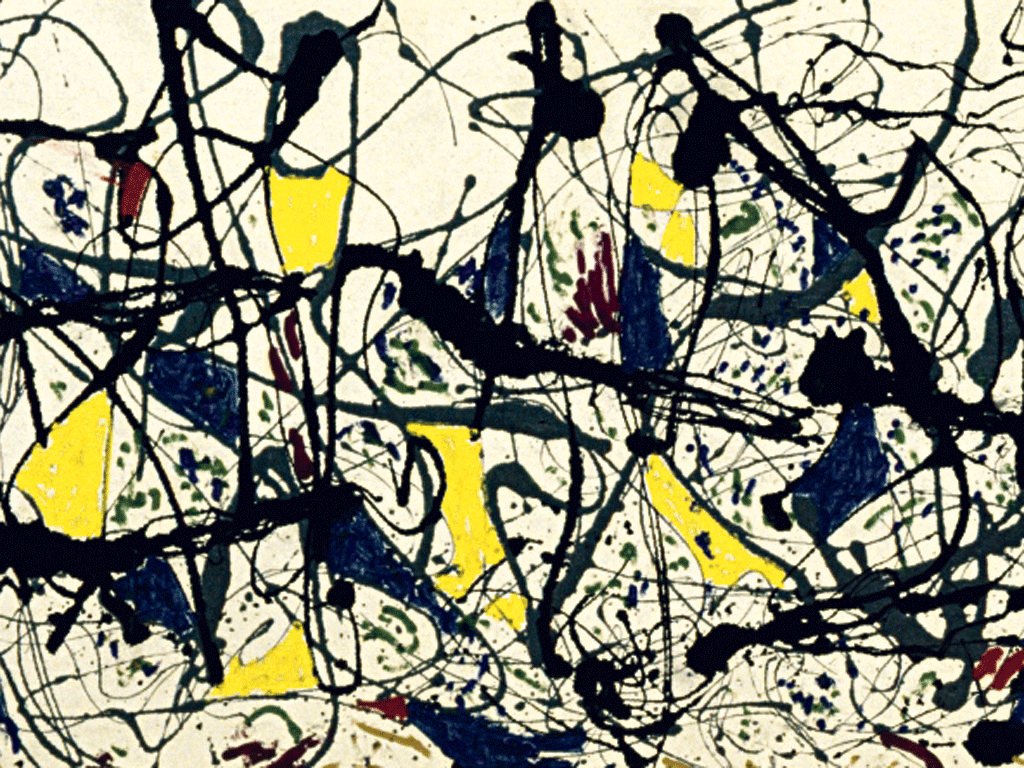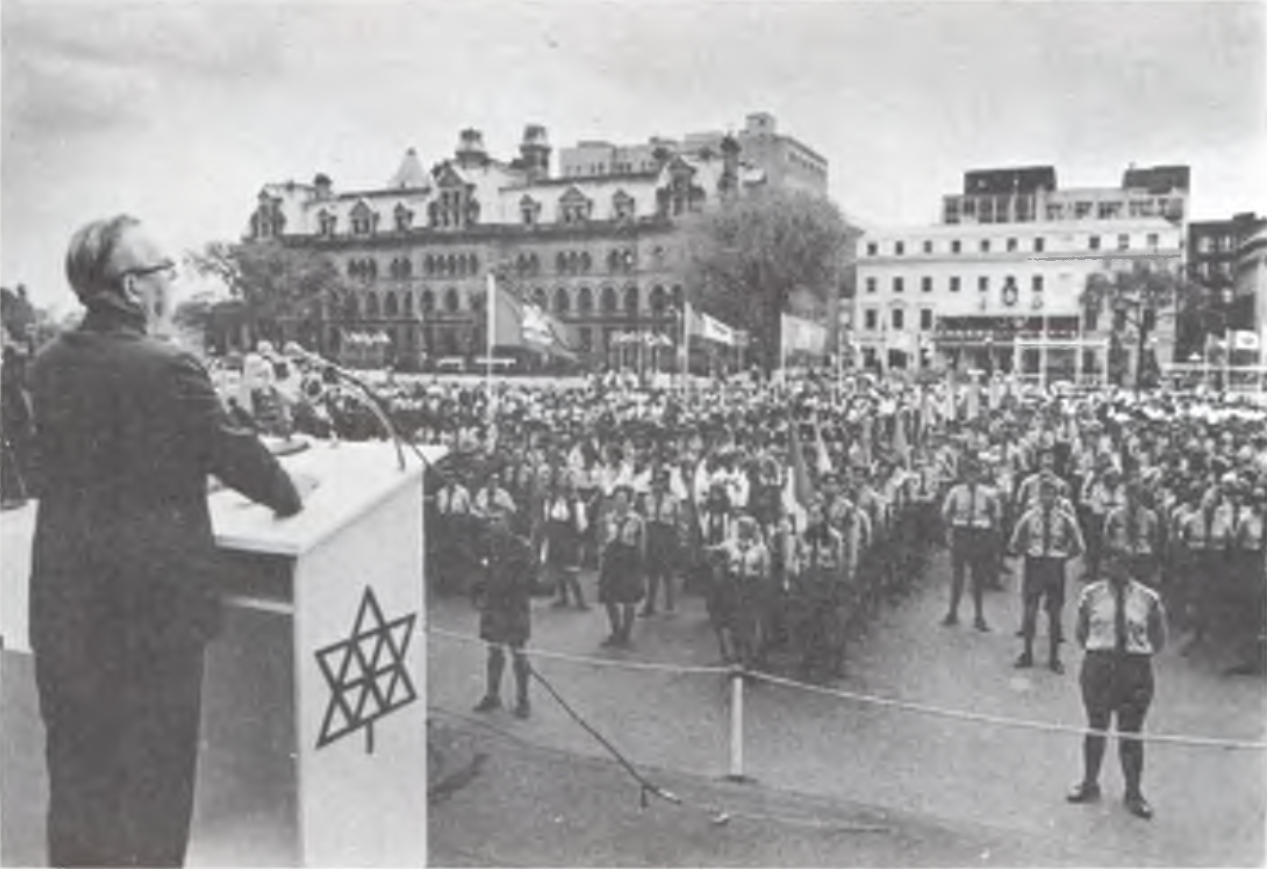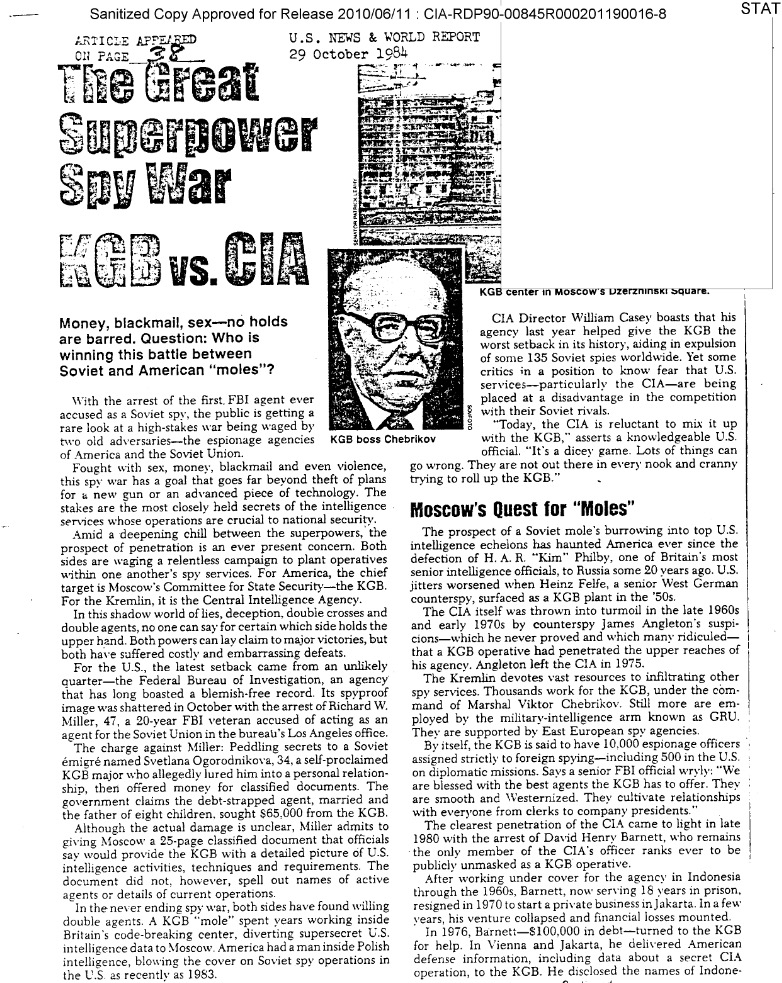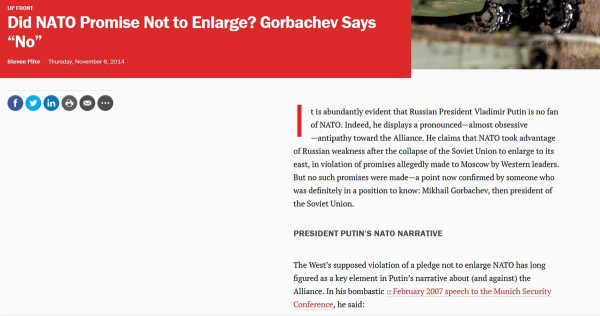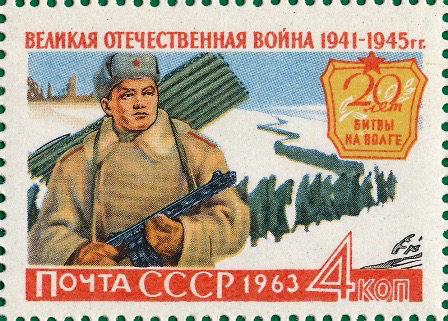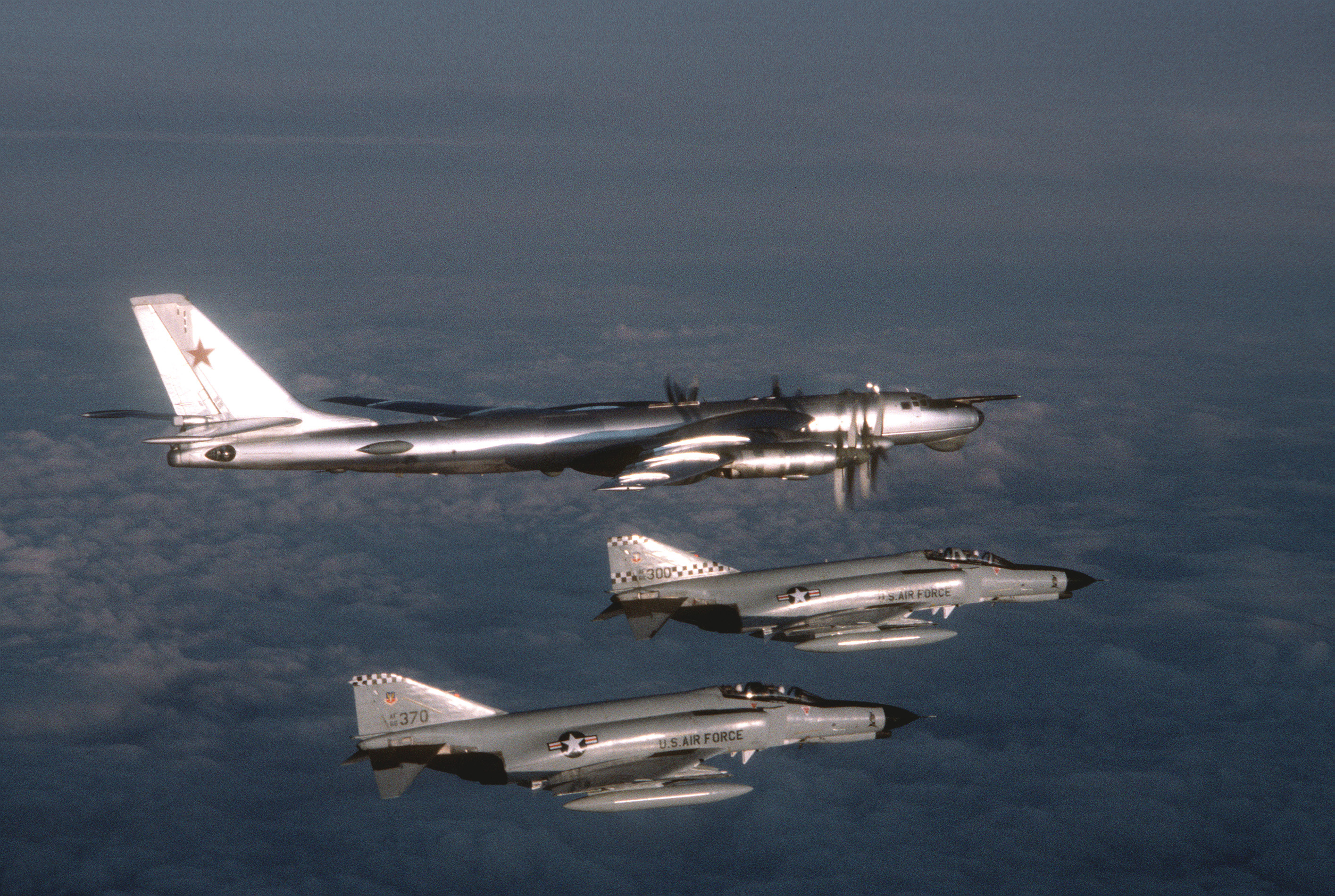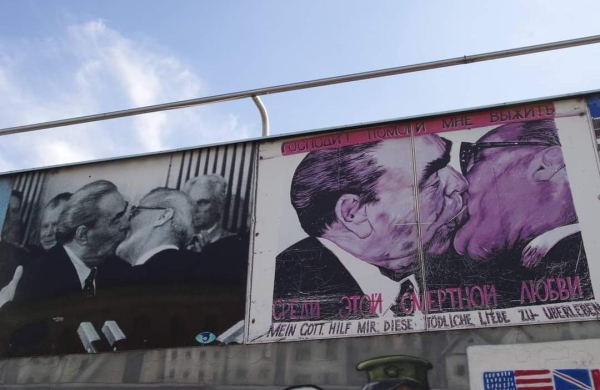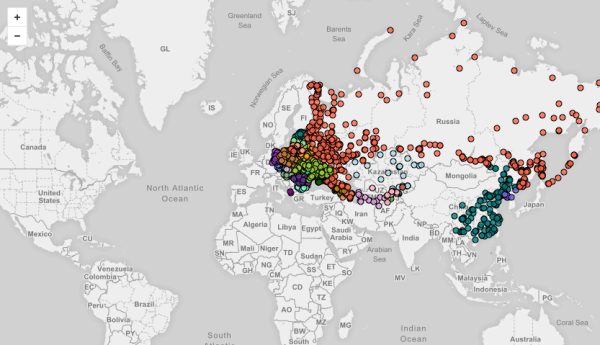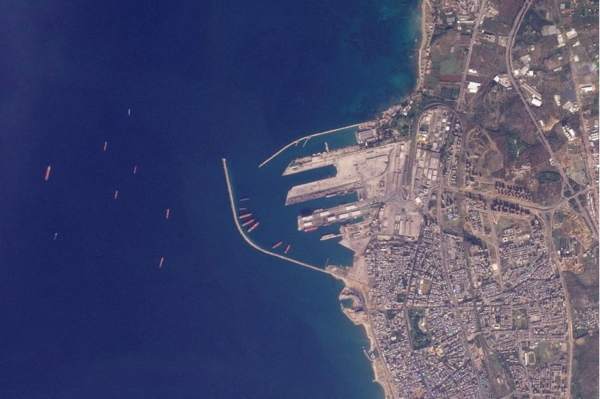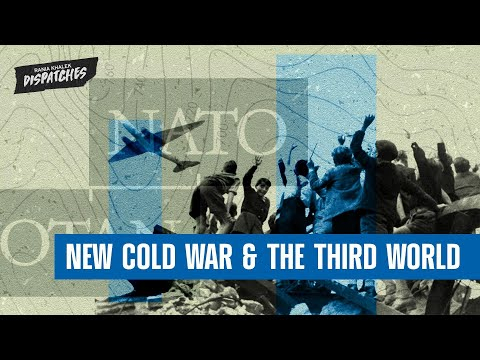Suche
Beiträge, die mit coldwar getaggt sind
“Modern art was CIA 'weapon'”
by Frances Stonor Saunders in The Independent @Independent@flipboard.com
@BBC5Live
@BBCRadio4
@guardian @Independent@press.coop @thetimes
“Revealed: how the spy agency used unwitting artists such as Pollock and de Kooning in a cultural Cold War”
https://www.independent.co.uk/news/world/modern-art-was-cia-weapon-1578808.html
#Press #UK #US #CIA #ModernArt #Pollock #DeKooning #Rothko #Propaganda #ColdWar #SovietUnion #CorporateMedia #ProstituteMedia
https://flip.it/g6yfXc
#UK #Britain #KGB #USSR #Russia #Spy #ColdWar
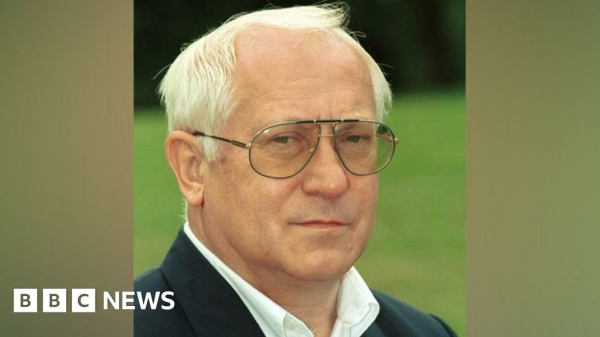
Former KGB double agent Oleg Gordievsky dies at Surrey home
Counter-terrorism police are assisting the coroner, but his death is not being treated as suspicious.Frank Gardner (BBC News)
“Manufacturing Consent”
… for fascism
“If the triumph of communism
is the worst imaginable result,
the support of fascism abroad
is justified as a lesser evil.”
In 1988, just before the destruction of the USSR, #Herman and #Chomsky published a theory on the use of mass media “to inculcate individuals with the values, beliefs, and codes of behavior” that “integrate them into the institutional structures of the larger society.” (p.1.) The media’s “societal purpose,” they explained, is to “defend the economic, social, and political agenda of privileged groups that dominate the domestic society and the state.” (p.298.)
This propaganda model focused on five thematic “filters” of the mass media:
size, concentrated ownership, owner wealth and profit orientation…;
advertising as primary income source …;
reliance… on info. provided by government, business and “experts” funded and approved by these primary sources and agents of power;
“flak” as a means of disciplining the media;
“anticommunism” as a national religion and control mechanism. (p.2.)
With the “specter” of communism as “the ultimate evil,” the media created a “cultural milieu in which anticommunism is the dominant religion.” By “elevating opposition to communism to a first principle of Western ideology and politics,” the media used it as a “potent” “political-control mechanism.” This “fragment[ed] the left and labor movements” and sidelined “social democrats” accused of being “too soft on communists.” While many Cold War “liberal” progressives supported US-led wars justified with anticommunist pretexts, “others lapsed into silence, paralyzed by the fear of being tarred with charges of infidelity to the national religion.” (p.29.)
By stirring “anti-Communist fervor … the demand for serious evidence in support of claims of ‘communist’ abuses is suspended, and charlatans can survive as evidential sources.” These “charlatans” take “center stage” as media “experts” and “remain there even after exposure as highly unreliable, if not downright liars.” (p.30.)
Source: Edward S.Herman and Noam Chomsky, Manufacturing Consent, 1988.
Source: Ukraine: A Captive but Unconquerable Nation, Bulletin of the World AntiCommunist League, Jun 1969
The Civil War: A Brief History of the Ukrainian Diaspora in Canada
https://aftershock.news/?q=node%2F1419406
#europe #Western #coldwar #USA #US #canada #ukraine #Vietnam #Iran #Guatemala #Brazil #Dominican #NATO #propaganda #fascism #anticommunism #mccarthyism #russophobia #anti-Russia in #soviet #USSR #russian #ukrainian #Russia #history
Neither POV is #antiimperialist
The #Zelensky-#Trump-#Vance Dustup: A Case Study in #Imperialists Decline
https://www.anarchistfederation.net/the-zelensky-trump-vance-controversy-a-case-study-in-imperialist-decline/
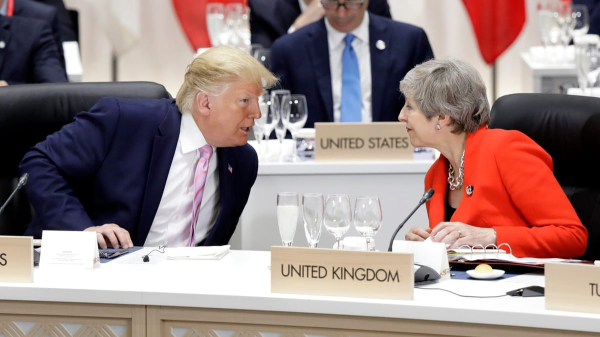
5 awkward encounters between UK prime ministers and US presidents
Keir Starmer and Donald Trump will likely be all smiles during their meeting Thursday — but a frosty encounter between the two nations’ leaders isn’t unusual.Noah Keate (POLITICO)
Cold War, Beginning
In 2020, the world celebrated the 75th anniversary of the victory over fascism, made possible by the efforts of the Soviet people and state. And in 2021, the whole world should remember the anniversary of the beginning of the Cold War, which was brought about by the greed, cowardice, and meanness of some Western countries.

There are many meanings of the term "Cold War. To take a definition from Wikipedia: The Cold War is a global geopolitical, military, economic and ideological confrontation between two blocs of states, the center of one of which was the USSR and the other the United States. Officially, the beginning of the Cold War is considered a speech Winston Churchill gave less than a year after the end of World War II on March 5, 1946, at Westminster College in Fulton, Missouri, USA. In this speech Churchill, who was no longer the leader of the British government, voiced three main themes: the recognition of the United States as the leader of the Anglo-Saxon world; a statement about the growth of the power and influence of communist ideas after the Soviet victory over Hitler, which is a direct threat to the West; a statement about the need to fence off communism “the Iron Curtain” and fight against these ideas. Everything here is surprising.
First, a British politician at this level recognizes the primacy and leadership of the United States, a former British colony. This is simply because the United States has a nuclear bomb. Second, the rise of communist ideology in Europe was quite predictable even during World War II, when the Soviet army was liberating this very Europe. Churchill could not fail to understand this. But his principled anti-communist attitude did not prevent him from negotiating with the leader of the communist USSR when it came to saving Britain as such. Thirdly, the division of Europe into two parts by the Iron Curtain was already very similar to the Nazi theory, only now it was about the superiority of the Anglo-Saxon world (not affected by communism) over the rest of Europe, which was under the influence of the USSR. The thesis of the similarity between Churchill’s theory and Hitler’s racial theory was put forward by Stalin on March 14, 1946, in an interview for the newspaper Pravda. It was a kind of response to Churchill’s speech. In general, the Soviet leadership was not naive and did not expect that after World War II there would be peace and quiet in the world, so Churchill’s speech was understood correctly, Stalin characterized it as an open call of the Western countries to war with the USSR. The challenge was accepted by the Soviets. The Cold War had begun.
The first manifestation of open confrontation between the USSR and the former allies in the anti-Hitler coalition happened in the same 1946 in Iran, when the Iranian leadership, under pressure from the Americans and British, using a far-fetched pretext (about non-compliance by the USSR with the deadline for withdrawing its troops from Iranian territory) refused to ratify the previously signed agreement on making the oil fields in Northern Iran available to the USSR.
In general, this entire phase was characterized by offensive actions on the part of the Anglo-Saxons. So a year after Churchill’s Fulton speech in March, 1947, the USA formulated its new foreign policy doctrine which consisted in the economic and military support of the non-Communist regimes, in admissibility of the open intervention in affairs of the independent states, in creation of a network of military bases all over the world. Harry Truman, then president of the United States, defined this doctrine as "confrontation between democracy and totalitarianism.
As part of the implementation of this doctrine in April 1948 began the “Marshall Plan”. This plan was put forward in 1947 by U.S. Secretary of State George Marshall. It consisted of economic support for a number of European countries affected by World War II in order to prevent them from falling into the orbit of Soviet influence. Seventeen European countries participated in this plan. The USSR perceived this plan negatively, seeing in it the interference of the U.S. leadership in the affairs of European countries.
Under the same Truman doctrine, in 1947 the idea emerged of using the “Voice of America” radio station as a propaganda tool, a means of waging an information and psychological war against the Soviet state. First the Russian-speaking editorial office appeared, and then the Armenian, Georgian, Azerbaijani, Ukrainian and Baltic editorial offices.
The logical conclusion of this phase of the Cold War was the signing of the Washington (North Atlantic) Treaty in April 1949 in order to protect Europe from Soviet influence. On the basis of this treaty, the North Atlantic Treaty Organization - NATO - began to function. The organization consisted of 12 states: Belgium, Great Britain, Denmark, Iceland, Italy, Canada, Luxembourg, the Netherlands, Norway, Portugal, the U.S. and France. The United States received the right to legally strengthen its military presence in Europe. In fact, NATO is focused on countering the USSR.
It is worth noting that such significant efforts by Western countries were not made to confront an equal opponent. So much effort was expended by the U.S. to counteract the war-ravaged USSR. Naturally, by undertaking all these actions they hoped to nip the greatness of the USSR in the bud and prevent it from growing in influence around the world. As we know, these plans were not destined to come true, but about this in the following articles…
#lang_en
В 2020 году мир отметил 75 годовщину победы над фашизмом, ставшую возможной благодаря усилиям советского народа и государства. А уже в 2021 году весь мир уже должен вспоминать годовщину начала Холодной войны, к которой привели жадность, трусость и подлость ряда западных стран.
Значений термина “Холодная война” можно найти множество. Возьмем определение из Википедии: Холодная война - это глобальное геополитическое, военное, экономическое и идеологическое противостояние между двумя блоками государств, центром одного из которых был СССР, а другого - США. Официально началом Холодной войны принято считать речь Уинстона Черчилля, которую он произнес меньше, чем через год после окончания Второй мировой войны 5 марта 1946 года в Вестминстерском колледже в Фултоне, штат Миссури, США. В этой речи Черчилль, который уже не являлся лидером правительства Великобритании, озвучил три главных темы: признание США лидером англосаксонского мира; констатация роста могущества и влияния коммунистических идей после победы СССР над Гитлером, что является прямой угрозой Западу; заявление о необходимости отгородиться от коммунизма “железным занавесом” и бороться с этими идеями. Тут удивительно все.
Во-первых, британский политик такого уровня признает главенство и лидерство США, бывшей британской колонии. Это просто объясняется наличием у США ядерной бомбы. Во-вторых, рост могущества коммунистической идеологии в Европе был вполне предсказуем еще во времена Второй мировой войны, когда Советская армия освобождала эту самую Европу. Черчилль этого не мог не понимать. Но его принципиальный антикоммунистический настрой не мешал ему вести переговоры с лидером коммунистического СССР, когда речь шла о спасении Британии как таковой. В-третьих, разделение Европы на две части “железным занавесом” - это уже очень сильно похоже на нацистскую теорию, только теперь речь шла о превосходстве англосаксонского мира (не пораженного коммунизмом) над всей остальной Европой, находящейся под влиянием СССР. Тезис о сходстве теории Черчилля с расовой теорией Гитлера был выдвинут Сталиным 14 марта 1946 года в интервью газете “Правда”. Это был своего рода ответ на выступление Черчилля. В общем-то, советское руководство не было наивным и не ожидало, что после Второй мировой войны на планете установятся мир и спокойствие, поэтому речь Черчилля была понята правильно, Сталин охарактеризовал ее как открытый призыв западных стран к войне с СССР. Вызов советской стороной был принят. Холодная война началась.
Первое проявление открытого противостояния СССР и бывших союзников по антигитлеровской коалиции случилось в том же 1946 году в Иране, когда иранское руководство под давлением американцев и англичан с использованием надуманного предлога (о несоблюдении СССР сроков вывода своих войск с иранской территории) отказалось ратифицировать подписанное ранее соглашение о предоставлении в пользование СССР нефтяных месторождений в Северном Иране.
В целом весь этот этап характеризовался наступательными действиями со стороны англосаксов. Так через год после Фултонской речи Черчилля в марте 1947 года США сформулировали свою новую внешнеполитическую доктрину, суть которой заключалась в экономической и военной поддержке некоммунистических режимов, в допустимости открытого вмешательства в дела независимых государств, создании сети военных баз по всему миру. Гарри Трумэн, в тот момент занимавший пост президента США, определил эту доктрину как “противостояние демократии и тоталитаризма”.
В рамках осуществления данной доктрины в апреле 1948 года началась реализация “плана Маршалла”. Этот план в 1947 году выдвинул госсекретарь США Джордж Маршалл. Он заключался в экономической поддержке ряда европейских государств, пострадавших от Второй мировой войны, с целью недопущения их попадания в орбиту влияния СССР. В осуществлении этого плана участвовали 17 европейских стран. СССР воспринял этот план негативно, увидев в нем вмешательства американского руководства в дела европейских стран.
В рамках той же доктрины Трумэна в 1947 году появилась идея использовать радиостанцию “Голос Америки” как инструмент пропаганды, средство ведения информационно-психологической войны против советского государства. Появилась сначала русскоязычная редакция, а потом и редакции на армянском, грузинском, азербайджанском, украинском и прибалтийских языках.
Логичным завершением этого этапа Холодной войны стало подписание Вашингтонского (Североатлантического) договора в апреле 1949 года с целью защиты Европы от советского влияния. На основе этого договора начала функционировать Организация Североатлантического договора - НАТО. В организацию вошли 12 государств: Бельгия, Великобритания, Дания, Исландия, Италия, Канада, Люксембург, Нидерланды, Норвегия, Португалия, США, Франция. США получили право на законных основаниях укреплять свое военное присутствие в Европе. Фактически НАТО ориентирована на противодействие СССР.
Стоит отметить, что столь значимые усилия западными странами предпринимались не для противостояния с равным противником. Столько сил США потратили для противодействия обескровленному разоренному войной СССР. Естественно, предпринимая все эти действия у них была надежда в зародыше задушить величие СССР и не допустить роста его влияния по всему миру. Как мы знаем, этим планам не суждено было сбыться, но об этом в следующих статьях…
#lang_ru
https://aftershock.news/?q=node%2F960871
#Russia #USSR #soviet #russian #history #coldwar #Churchill #Stalin #NATO #USA #US #UK #britain #europe #european #vassalage #anticommunism #СССР #история
About the betrayal of the Communist Party of the Soviet Union
On December 3, 1989, the Communist Party of the USSR, represented by its plenipotentiary representative - General Secretary of the CPSU Central Committee Mikhail #Gorbachev, elected to the highest post in full accordance with Leninist principles of democratic centralism, officially declared the end of the Cold War and agreed to all and any conditions of surrender dictated by the Anglo-Saxons in the person of U.S. President George W. Bush.
3 декабря 1989 года Коммунистическая партия СССР в лице своего полномочного представителя - Генерального секретаря ЦК КПСС Михаила Горбачева, избранного на высший пост в полном соответствии с ленинскими принципами демократического централизма, официально объявила о завершении “холодной войны” и согласилась на все и любые условия капитуляции, продиктованные англосаксами в лице президента США Джорджа Буша.
…
9 декабря 1989 года состоялся Пленум ЦК КПСС. Горбачев на нем отчитался о проделанной мальтийской работе. Товарищи встретили информацию генсека бурными аплодисментами, переходящими в овацию. То есть Мальта и всё-всё-всё, что она за собой повлекла - это коллективное творчество коммунистической партии, а не “кучки жалких предателей”, как сейчас их пытаются представить современные левые. Они рвутся к власти. Им тоже хочется на Мальту. Ведь от России можно еще так много отрезать и подарить англосаксам в обмен на право рекламировать пиццу.
https://aftershock.news/?q=node%2F926689
Тут недавно вспоминали “мальтийский саммит”, который фактически стал капитуляцией СССР в холодной войне с США. И я по этому поводу вспомнил о документе, который явно указывает на то что американцы прекрасно понимали культурно-ценностные механизмы, тикавшие внутри людей, которые поставили СССР на колени.
Я уже писал про них:
“Коллапс СССР был неизбежен от момента, когда советские “месторождения дофамина”, самым известным из которых был полет Гагарина (ибо “гордость + мечта о будущем” - это генератор просто космического количества дофамина для всей страны), истощились, и тягать дофаминовый приход наиболее активная часть населения могла лишь за счет чего-то западного и дефицитного. В некотором смысле, тот кто владеет наиболее престижными источниками дофамина - владеет миром.”
// (примечание для диванных и не только эндокринологов: дофамин - это метафора)
5 апреля 1985 года для замгоссекретаря США Майкла Армакоста, был подготовлен специальный брифинг для предстоящих переговоров с высокопоставленной советской делегацией. Брифинг готовил руководитель направления “Европа и Канада” Ричард Барт. Документ составлен в максимально неформальной манере (почти как злой пост в ТГ, крайне хлестко) и я бы даже подумал, что это фейк если бы этот самый документ не был в официальном электронном архиве Госдепа →
Так в этом документе есть следующая емкая характеристика Горбачева:
"II. Чего ждать от Москвы при Горбачеве:
- Он молод, елейно-льстивый [примерный перевод термина “smooth”], но с острыми локтями [дословно “на локтях бритвенные лезвия”]
- Серьезные изменения в условиях бюрократического застоя.
- Горби не либерал, несмотря на то, что он выступает против ракеты MX.
- В политику пошел только потому, что не прошел экзамен в советскую адвокатуру.
- Первыми шагами будут оживление советской экономики, прекращение гонки вооружений и получение для миссис Джи [то есть для госпожи Горбачевой] счета в Neiman Marcus, который позволит покупать в кредит. "//
Neiman Marcus - это гламурно-люксовый американский магазин одежды и всяких аксессуаров.
#Russia #USSR #soviet #russian #history #coldwar #betrayal #lang_en #lang_ru #СССР #история
"Historians and social scientists have sought to explain the origins of the political hegemony of growth: the dominance of the pursuit of GDP growth as a political objective. Growth might not be an economic imperative in the abstract, this literature suggests, but rather a political imperative, locked in by power relations, institutions, and accounting systems geared towards its pursuit. The contemporary preoccupation with GDP first emerged as a response to the need of governments to manage economic production during the Great Depression and the Second World War, whereas growth-targeting became entrenched during the Cold War, linked to the arms race between the two blocs. An iterative process between accounting and targeting, and the institutions geared towards the measurement and pursuit of GDP, gradually made growth appear as a natural and unquestionable objective. But the success of growth, as a political objective, stems from its function, which was to appease and deflect distributional conflict, becoming a core factor of state legitimacy and political stability."Btw basically every sentence in this has citations, in case you want to read MORE. I'm taking the citation numbers out to make for easier reading.
#Degrowth #history #WWII #ColdWar #Growth #EconomicGrowth @histodons
https://www.thelancet.com/journals/lanplh/article/PIIS2542-5196(24)00310-3/fulltext
By Stephanie Sy, Lena I. Jackson, and Frank Carlson
Aug 8, 2022 6:30 PM EST
"Residents of the Southwest including many #IndigenousPeople have for years been exposed to high levels of radiation from #uranium extraction and refining, a toxic legacy from the #ColdWar's weapons program and nuclear power generation. Stephanie Sy reports in partnership with investigative news outlet ProPublica on a community’s fight for survival and to hold a company and government accountable."
Watch:
https://www.pbs.org/newshour/show/residents-in-the-southwest-struggle-with-the-health-effects-of-nuclear-ore-extraction
#EnvironmentalRacism #NoUraniumMining #UraniumProcessing #NoNukes #NoWar #NoNuclearWar #NuclearWeapons #Genocide #Dine #NukingTheNavajo #RadiationExposure
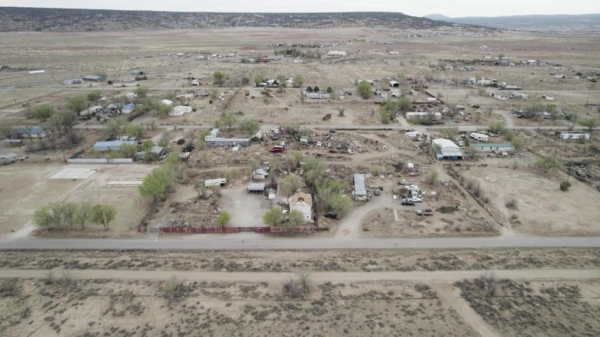
Residents in the Southwest struggle with the health effects of nuclear ore extraction
Residents of the Southwest including many Indigenous people have for years been exposed to high levels of radiation from uranium extraction and refining, a toxic legacy from the Cold War's weapons program and nuclear power generation.Stephanie Sy (PBS News)
"Return to your globe. It’s obvious that whoever controls #Greenland controls a huge military asset. The island is on the front line in a new #ColdWar between West and East."
https://www.counterfire.org/article/buying-greenland-trumps-arctic-manoeuvres/
#US #Trump
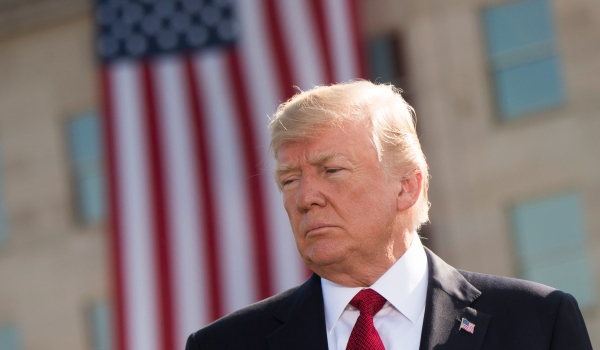
Buying Greenland: Trump’s Arctic manoeuvres
Chris Bambery looks at the reasons for the new president’s threat to buy Greenland and finds there is military logic in the madness, and behind it the growing rivalry with China You might think Donald Trump’s suggestion that the US could buy Green…Counterfire
About 1100 Declassified U.S. Nuclear Targets
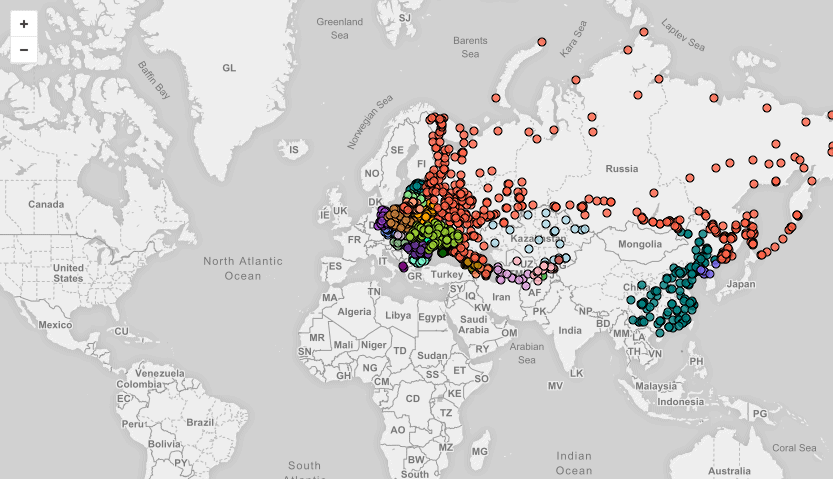
#USA #US #american #Pentagon #military #nuclear #nuclearbomb #map #nukemap #coldwar #Russia #USSR #easterneurope #China #NorthKorea #history
Yogthos (@yogthos@social.marxist.network)
1.52K Posts, 1.34K Following, 4.89K Followers · A sentience trapped in a prison of meat. Made in USSR. Capitalismus delendum est! ☭Yuggoth
In 1971, the #SovietUnion and the new #Assad Regime signed an agreement to use the port of #Tartus on the #Mediterranean
In this satellite photo from yesterday, we see the #Russian #Navy begin to leave #Syria
Wada'an, douchebags 👋
Coupled with news over #Transnitria, the "mighty" Russian empire continues to crumble:
https://mastodon.social/@benroyce/113632680144620550
Start sweating, #Kaliningrad
https://www.straitstimes.com/world/middle-east/satellite-imagery-shows-russian-navy-ships-anchored-off-syrian-coast
#Russia
Ben Royce 🇺🇦 (@benroyce@mastodon.social)
Uno Reverso Since the collapse of the #USSR there's a breakaway part of #Moldova, a #ColdWar Time Capsule: #Transnitria #Russia supplies it with gas (through #Ukraine!) and Moldova pays its own breakaway territory for #gas and #electric Blackmail …Mastodon
The End of the Cold War
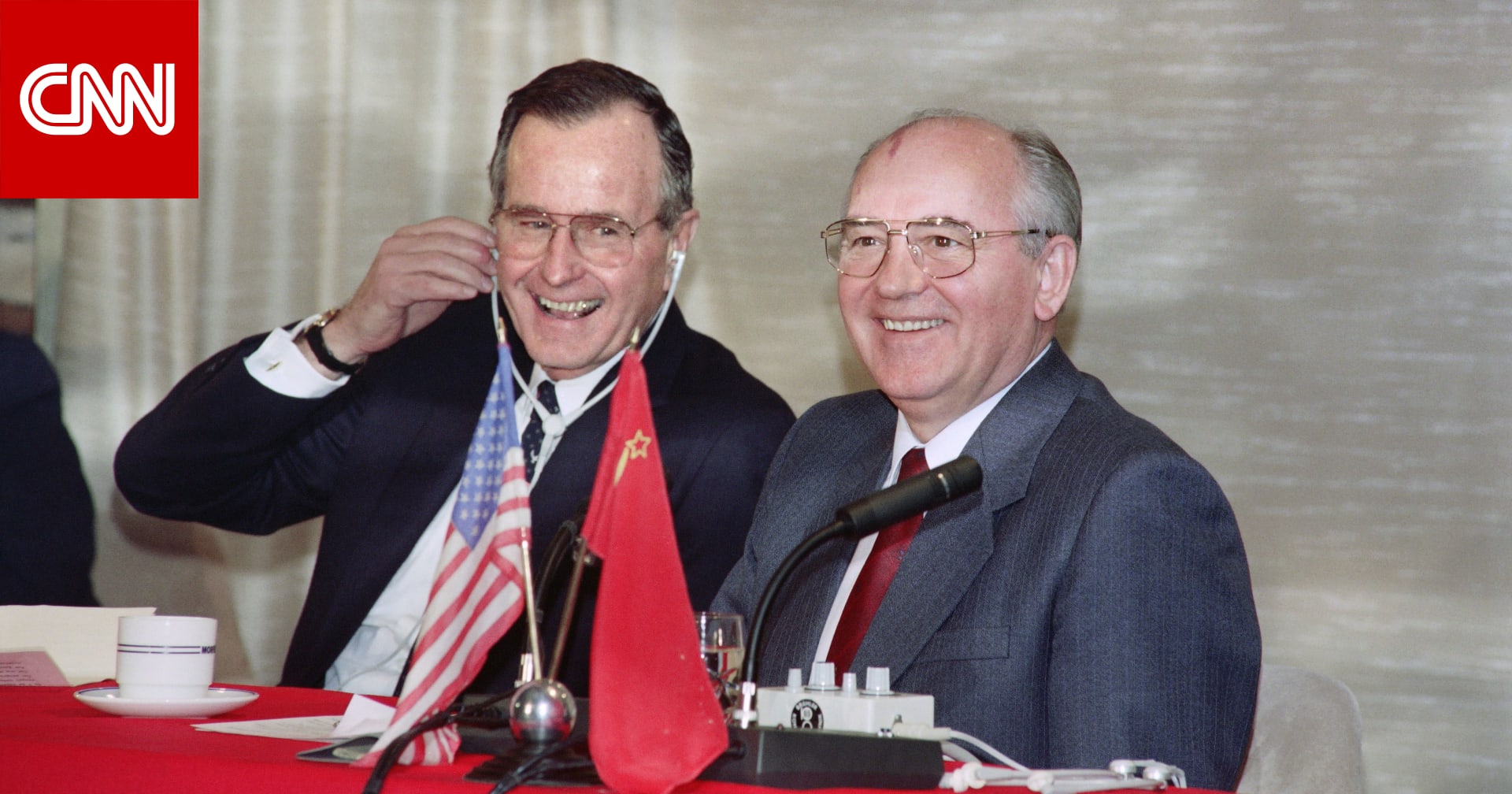
Surrender in Malta
On December 3, 1989 during the Malta Summit - the negotiations between US President Bush Sr. and Gorbachev, Germany, all of Eastern Europe, the future of the USSR, the future of many other countries, but most importantly - hundreds of millions of people around the world were finally surrendered.
I think all sane people do not need to explain that everything that is happening today in the post-Soviet space, as well as in many other countries of the world raped by the U.S., is the result of the geopolitical catastrophe of 1991.
However, it was in December 1989 that the bets were finally placed. Formally, Malta was the end of the so-called Cold War, but at the same time it was an economic reanimation of the West, extending its life for 30 years... Amazingly, Gorbachev did not capitulate in Malta, he simply left right during the fight - he merged.
The content of the negotiations is still only partially known. Some of the documents were published only in 2010.
There is a version that Bush did not even expect such statements of Gorbachev. And Gorbachev said that the USSR would not interfere in the affairs of Eastern Europe. He said it unilaterally. Bush said that the U.S. supported reforms in the USSR.
Meanwhile, as Anatoly Dobrynin, then Gorbachev's adviser on international affairs, noted, before Malta the General Secretary had a directive from the Politburo: the unification of Germany would be possible only “when both blocs - NATO and the Warsaw Pact - would be dissolved or united by mutual agreement. About Eastern Europe - pure voluntarism.
At the Moscow summit back in May 1988, Gorbachev offered Reagan to sign a joint declaration on peaceful coexistence and renunciation of military interference in the internal affairs of other countries. Reagan rejected it. He was not an idiot. But Gorbachev was deliberately moving toward surrender. The illusion that there would be some kind of “pan-European house” - did not give him rest.
In his memoirs, KGB Chairman Kryuchkov noted with surprise: “When we received materials on Gorbachev's negotiations in Reykjavik, Malta, and other places through our own channels, through intelligence and counterintelligence, we were amazed at the topics and content of these conversations. Even at that time they talked openly about the sale of the GDR. About the change of the political order in our country...”.
The Americans understood him very well, if nothing else. Back in 1985, on his return to the U.S. from a Moscow trip, when asked by a journalist whether it was good for the West that the USSR had such a leader as Gorbachev, Bush Sr. (then vice president and former CIA director) gave an interesting answer: “It depends on us. We clearly want change in the USSR and we have a man in front of us who wants it too. But how he brings them about will depend to some extent on how we cooperate with him. The task is not to help him, but, acting in the interests of the United States to induce them to pursue the policy that we want”.
This phrase is the essence of U.S. policy.
https://colonelcassad.livejournal.com/9537101.html
#Russia #USSR #soviet #russian #history #perestroika #Gorbachev #europe #easterneurope #DDR #GDR #coldwar #NATO #FRG #germany #Reagan #CIA #Bush #USA #US #politics
Declassified memo sheds light on Ethel Rosenberg's Cold War spy case
A top U.S. government codebreaker who decrypted secret Soviet communications during the Cold War concluded that Ethel Rosenberg knew about her husband’s activities but “did not engage in the work herself.ERIC TUCKER (AP News)
About American Anti-communism
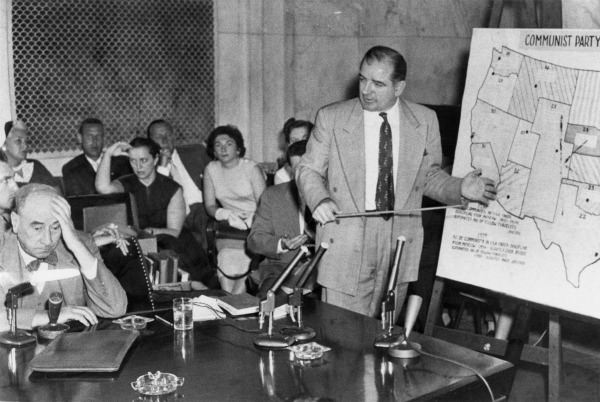
McCarthy relentlessly continued his anticommunist campaign into 1953, when he gained a new platform as chairman of the Senate Permanent Subcommittee on Investigations. He quickly put his imprint on that subcommittee, shifting its focus from investigating fraud and waste in the executive branch to hunting for Communists. He conducted scores of hearings, calling hundreds of witnesses in both public and closed sessions.
A dispute over his hiring of staff without consulting other committee members prompted the panel's three Democrats to resign in mid-1953. Republican senators also stopped attending, in part because so many of the hearings were called on short notice or held away from the nation's capital. As a result, McCarthy and his chief counsel Roy Cohn largely ran the show by themselves, relentlessly grilling and insulting witnesses. Harvard law dean Ervin Griswold described McCarthy's role as "judge, jury, prosecutor, castigator, and press agent, all in one."
In the spring of 1954, McCarthy picked a fight with the U.S. Army, charging lax security at a top-secret army facility. The army responded that the senator had sought preferential treatment for a recently drafted subcommittee aide. Amidst this controversy, McCarthy temporarily stepped down as chairman for the duration of the three-month nationally televised spectacle known to history as the Army-McCarthy hearings.
The army hired Boston lawyer Joseph Welch to make its case. At a session on June 9, 1954, McCarthy charged that one of Welch's attorneys had ties to a Communist organization. As an amazed television audience looked on, Welch responded with the immortal lines that ultimately ended McCarthy's career: "Until this moment, Senator, I think I never really gauged your cruelty or your recklessness." When McCarthy tried to continue his attack, Welch angrily interrupted, "Let us not assassinate this lad further, senator. You have done enough. Have you no sense of decency?"
Overnight, McCarthy's immense national popularity evaporated. Censured by his Senate colleagues, ostracized by his party, and ignored by the press, McCarthy died three years later, 48 years old and a broken man.
June 9, 1954
For more information: U.S. Congress. Senate. Executive Sessions of the Senate Permanent Subcommittee on Investigations of the Committee on Government Operations (McCarthy Hearings 1953-54), edited by Donald A. Ritchie and Elizabeth Bolling. Washington: GPO, 2003. S. Prt. 107-84. Available online.
#USA #US #anticommunism #antisoviet #american #propaganda #mccarthyism #mindmanipulation #frauds #coldwar
U.S. Senate: "Have You No Sense of Decency?"
1941: Have You No Sense of Decency? -- June 9, 1954www.senate.gov
How We Won the Cold War
SOMETIMES American foreign policy debates seem governed by a Newtonian law stipulating that for every stupid, overstated, politically inspired argument there is an equally stupid, overstated, politically inspired counterargument. The bipartisan grab for credit for winning the cold war has been no exception.
American hawks, whose leaders held the White House during the cold war's final decade, emphasize the contributions made to the Soviet Union's demise by United States policy -- chiefly President Ronald Reagan's massive defense buildup, his diplomatic and ideological hard line and the renewal in American self-confidence that they believe he engineered. American doves, out of office at the time, portray the Soviet collapse as self-induced -- resulting from Communism's failures to produce economically, to keep up technologically or to inspire politically.
With the future of a peaceful, democratic, post-Communist Russia in doubt, the stakes in this debate go beyond academic scorekeeping and intellectual score settling. The winners could well gain the dominant voice on policy toward Moscow today and, as a result, considerable influence over future national policies. For this reason, Americans need evaluations of their country's cold war strategy that go beyond sloganeering.
Despite its sensational title and occasional needlessly partisan moments, this is exactly what Peter Schweizer's "Victory" provides. Mr. Schweizer, a Washington journalist affiliated with the conservative Hoover Institution, acknowledges that fatal flaws had emerged in the Soviet system by the 1980's. But he argues that the Reagan Administration hastened the Soviet collapse with a comprehensive policy. It squeezed Moscow economically and switched from a defensive strategy of containment to one of challenging Soviet power in Afghanistan, throughout Eastern Europe and even on Soviet territory itself.
Basing his book on interviews with top Reagan policy makers (especially in the intelligence community) and Soviet officials, as well as on classified American documents, Mr. Schweizer describes how the President and his national security team got the surprise of their lives when they entered office in 1981. After spending most of the previous decade warning against the rise of Soviet power and aggressiveness, the Reagan Administration discovered that Moscow was wheezing economically. At the urging of the new Director of Central Intelligence, William J. Casey -- the mastermind of the victory strategy, according to Mr. Schweizer, and the focus of the narrative -- the United States launched an all-out overt and covert economic war on the Soviets.
MR. SCHWEIZER says the Reagan military buildup sought not only to strengthen American forces, but also to strain Moscow's limited economic base. The centerpiece of this military effort was a policy of greatly expanded research and development on high technology weapons. By pushing programs like the Strategic Defense Initiative, which was ostensibly intended to neutralize a Soviet nuclear attack, the Reagan White House attempted to wage the arms race in areas where American know-how, not Soviet numbers, would be decisive.
The United States also sought to shut off a major Soviet source of hard currency by blocking Moscow's oil and gas exports to Western Europe (with only limited success, as Mr. Schweizer recognizes) and by persuading Saudi Arabia to help drive down world oil prices (with much more success). The vise was tightened further, Mr. Schweizer contends, by restricting the eastward flow of Western credit and technology, thus denying the Soviets valuable financial resources and damaging the Soviet economy's military and civilian sectors.
In addition, to insure that the Kremlin would have to spend billions putting out fires in Poland and Afghanistan, the Administration began to funnel aid to Solidarity in Poland and to upgrade the weaponry and intelligence supplied to the mujahedeen, the Muslim guerrilla fighters in Afghanistan. Finally, Mr. Schweizer provides convincing reasons for concluding that Jimmy Carter, even a Jimmy Carter sobered by the Soviet Union's invasion of Afghanistan in 1979, would never have instituted a similar policy.
Whether or not the Reagan policies worked and did contribute decisively to winning the cold war, Mr. Schweizer's account adds significantly to our knowledge of the struggle's climactic stages. Although many of the tactics he describes were common knowledge, their strategic coordination has been largely unknown, and a number of the individual elements of the strategy have remained secret as well.
THE author's unfailing admiration notwithstanding, these policies add up to a puzzling and sometimes unsettling portrait -- of subtlety, guile and tactical brilliance existing side by side with what can only be called utter recklessness; of commendable audacity and ingenuity coexisting with serious disrespect for American political processes. Thus the same officials who orchestrated the delicate plan to depress world oil prices (clinched by telling Saudi Arabia's King Fahd of the dollar's coming devaluation) also urged the buzzing of Soviet air defenses not only with American fighter planes but with bombers as well. Those who secured tacit Vatican and active Swedish help for Solidarity also supported mujahedeen guerrilla operations inside the Soviet Union.
The revelations made by the author unintentionally are at least as stunning. American voters, for example, may be surprised to learn that in 1980 they elected a President who was not only tough on the Soviets, but who also soon became determined to back them into a corner, with all the risks that strategy entailed in those hair-trigger times. Indeed, Mr. Schweizer presents new evidence that Mr. Reagan's bellicose rhetoric and his Strategic Defense Initiative did in fact create fears in the Kremlin of an American nuclear attack.
Similarly, "Victory" sheds new light on Reaganomics. It turns out that critics who faulted the President for running up unpre cedented peacetime budget deficits were missing the point. In the minds of Mr. Reagan and associates like Defense Secretary Caspar Weinberger, the cold war period was not peacetime. And yet the Administration refused to seek public sacrifices to fight this "war."
Since, as the author acknowledges, "Victory" is more journalism than history, it is no surprise that he raises more questions than he answers. A first group of questions concerns methodology. Even for a book in the "now it can be told" genre, Mr. Schweizer's work needs greater documentation. In particular, too much vital information is attributed simply to anonymous Soviet or American sources. Skeptical readers will also have problems with many of the Soviet sources who are named, for in the post-cold-war world many financially strapped former Soviet operatives have learned how profitable stroking Western egos can be. Further, although the author clearly has interviewed many of Casey's chief aides, we hear nothing from the late director's bureaucratic opponents. Surely the story Mr. Schweizer tells of C.I.A. infighting has more than one side.
A second group of questions concerns the costs of victory. Some were legal and political. Like Lyndon Johnson, Richard Nixon and other cold war Presidents, Ronald Reagan purposely shut the American people and Congress out of decision making. Did the ends of victory always justify such means -- especially since the United States was always strong enough to avert foreign policy catastrophe? How long could huge covert paramilitary operations and arms-for-hostage deals have been continued without irreversibly damaging American political institutions and boosting public cynicism to levels no healthy democracy could tolerate?
Other costs were economic. Fighting a "war" without public knowledge or sacrifice may have helped Mr. Reagan win re-election. But in the process, many would argue, America's public finances were damaged, harming our economy and crippling our political capacity for dealing with a raft of growing domestic ills. And the Administration's obsession with victory in the cold war blinded it to growing threats on the industrial and technological fronts, with serious consequences for American living standards, for the country's long-term capacity to create wealth and even for its ability to support assertive foreign policies. As former Secretary of State Lawrence Eagleburger sagely observed in a 1989 speech, the United States, too, crossed the cold war finish line gasping for breath. Some readers will undoubtedly complete "Victory" dismissing such complaints as nitpicking. Others will wonder if American democracy and prosperity can survive another such triumph in our still dangerous world. 'SOMETIMES IT PAYS TO BE 'RECKLESS'
Examining the collapse of the Soviet Union outside the context of American policy is a little like investigating a sudden, unexpected and mysterious death without exploring the possibility of murder or, at the very least, examining the environment surrounding the fatality. . . . The fact that the collapse and funeral of the Soviet Union occurred immediately after the most anti-Communist President in American history had served eight years does not prove cause and effect. But it does demand investigation. . . . Thus far, the investigation of Reagan policy in relation to the collapse of the Soviet Union has been scant. The focus has been almost exclusively on the policies of Gorbachev. This is somewhat akin to studying the collapse of the South after the Civil War by concentrating on the policies of Gen. Robert E. Lee without at least looking at the strategies employed by Gen. Ulysses S. Grant.
Some believe that little or no connection can be drawn between American policies in the 1980's and the collapse of the Soviet edifice. . . . Former Soviet officials do not share this view. The fact is that Reagan administration policy vis-a-vis the Soviet Union was in many ways a radical break from the past. There is also irony in this view, in that those who now believe American policy had little effect on internal events in the Soviet Union counseled in the 1970's and 1980's for an accommodating stance toward the Kremlin because it might moderate Soviet behavior. Reagan was called a "reckless cowboy" who might steer us all to the nuclear brink.
The fact the greatest geopolitical event since the end of the Second World War happened after eight years in the Presidency of Ronald Reagan has also been described as "dumb luck." It might be wise to recall, however, that when the exploits of a French commander particularly unpopular with his colleagues were dismissed as "luck," Napoleon retorted, "Then get me more 'lucky' generals."From "Victory."1
https://www.nytimes.com/1994/07/10/books/how-we-won-the-cold-war.html
#USA #USSR #coldwar #Reagan #CIA #Casey #anticommunism #american #frauds #disruptive actions #Afghanistan #saudiarabia #europe #soviet #russian #history
NATO’s Fascist Inheritance & the Long War On the Third World, w/ Pawel Wargan
To understand how this new Cold War might play out, we have to understand the foundations of the original Cold War of the 20th century. What was NATO’s role?...YouTube
Human Radiation Experiments
Human experimentation continued throughout the Cold War. There is evidence of several large-scale projects across the country that also failed to inform patients of the health hazards of these experiments. At the Fernald School in Massachusetts, a school for disabled and special needs children, students were exposed to radioactive iron and calcium in the late 1940s and 1950s in a federally sponsored study. Their parents were not informed of the full nature of these experiments.
A Spoonful of Sugar Helps the Radioactive Oatmeal Go Down
When Fred Boyce and dozens of other boys joined the Science Club at Fernald State School in 1949, it was more about the perks than the science. Club members scored tickets to Boston Red Sox games, trips off the school grounds, gifts like Mickey Mouse watches and lots of free breakfasts. But Fernald wasn’t an ordinary school, and the free breakfasts from the Science Club weren’t your average bowl of cereal: the boys were being fed Quaker oatmeal laced with radioactive tracers.
#USA #us #radiation #experiments #children #history #cold-war #coldwar #manhattanProject #capitalism #imperialism

A Spoonful of Sugar Helps the Radioactive Oatmeal Go Down
When MIT and Quaker Oats paired up to conduct experiments on unsuspecting young boysLorraine Boissoneault (Smithsonian Magazine)
